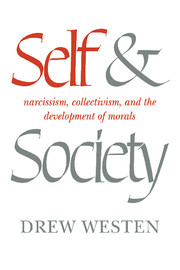Book contents
- Frontmatter
- Contents
- Preface
- Part I A theory of personality
- Part II A theory of culture
- Part III Personality and culture: a synthesis
- 8 Culture and personality: dying species or vigorous hybrid?
- 9 Psychic and sociocultural structure and dynamics
- 10 Personality and communitarian collectivism
- 11 The psychodynamics of modernization
- 12 Personality and sociocultural change
- 13 Breakdown and recovery: paradigmatic processes in personal identity and cultural integration
- 14 Personality and individuation
- References
- Index
11 - The psychodynamics of modernization
Published online by Cambridge University Press: 11 November 2009
- Frontmatter
- Contents
- Preface
- Part I A theory of personality
- Part II A theory of culture
- Part III Personality and culture: a synthesis
- 8 Culture and personality: dying species or vigorous hybrid?
- 9 Psychic and sociocultural structure and dynamics
- 10 Personality and communitarian collectivism
- 11 The psychodynamics of modernization
- 12 Personality and sociocultural change
- 13 Breakdown and recovery: paradigmatic processes in personal identity and cultural integration
- 14 Personality and individuation
- References
- Index
Summary
Since the end of the Second World War, many Western eyes have cast ambivalent glances toward the Third World, and a multitude of non-Western eyes have reciprocated. Cognizant of the upheavals and transformations to ensue, social scientists in the early postwar era tried to develop the conceptual tools through which to understand the great transformation in the South. Many of the early theories accepted evolutionist principles stemming from nineteenth century anthropologists such as Morgan and Maine; societies bereft of modern technology represented images of a lost and simple world, and an analysis of change in underdeveloped countries could provide insight into the Western past.
Throughout the 1950s and 1960s, the impact of functionalism on theories of modernization was profound. The functionalist approach of Talcott Parsons found expression in works such as Marion Levy's two-volume opus, Modernization and the Structure of Societies (1966). The term “modernization” became popular in the 1960s, as did the comparative historical approach (see, for example, Black, 1966).
By the 1960s the audience for the literature on modernization had spread to the Third World, and in 1968 Samuel Huntington expanded the focus of analysis from societal evolution to political stability with the publication of Political Order in Changing Societies. At the same time, writers such as Gusfield (1967) and Whitaker (1967) began to question the whole notion of modernization, with its assumption of a movement from a condition called “tradition” to another referred to as “modernity.” Other authors continued those attacks through the following decade (Tipps, 1973; Shiner, 1975; Migdal, 1979), arguing from examples in the contemporary Third World that modernity may not, in fact, constitute a single syndrome.
- Type
- Chapter
- Information
- Self and SocietyNarcissism, Collectivism, and the Development of Morals, pp. 330 - 354Publisher: Cambridge University PressPrint publication year: 1985
- 1
- Cited by



